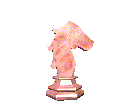

Let me begin with a cautionary tale: A friend, pleased with her Kokopelli earrings, showed them to us proudly. "Do you know WHO Kokopelli is?" I asked. "Naw," she said. Within a month, she and her boyfriend had a strange evening in which FIVE condoms broke. And she brought a bundle of joy into the world. The fact that Kokopelli is, in some circles, a fertility god may or may not be germane, but always remember, just because YOU don't believe in THEM doesn't necessarily mean that THEY don't believe in YOU.
Why is this important? Well, here we have resurrected another pantheon of Gods and Goddesses. The art of casting runes is certainly not confined to any one region or religion, but take the Kokopelli example to heart. If there's nothing to any of this, you shouldn't be buying this stuff in the first place.
That said, The Eye of Horus is a class act, in terms of production and packaging. The book is well-written and informative, and you should get comparable results to any other divination form. The format of the guide is well put together, although the page on "who" for each God and Goddess is a bit too warm and fuzzy for my tastes. Still, a fine job, and an excellent gift choice, given the above warning. Recommended.
Stories & Early Novels, and Later Novels & Other Writings, by Raymond Chandler, Library of America, $35 ea., 1204 pp. and 1078 pp., respectively.
You simply (seemingly) can't go wrong with the Library of America. These books are books as books were meant to be. A bibliophile will admire the typesetting (Galliard, herein), the binding, the paper, the silk marker ribbon.
For the rest of us, the editorial process is every bit as satisfying (if not more so) than Viking's legendary Portable series, and herein Raymond Chandler finally gets the publication that he deserves.
I remember walking into Chatterton's Books on Vermont Avenue in Hollywood one fine day in the spring of 1986, and noting Chandler titles in the window. And it occurred to me that Chandler would have NEVER been allowed into such a toney bookseller's during his lifetime. Chandler, in the immortal blurb, "wrote like a slumming angel." I can't think of a better description. Without Poe, Hammett and Chandler, the modern genre of the mystery would either not exist at all, or be much poorer for their lack.
Here are ALL the masterpieces - most written for the seedy, disreputable pulps, most notably, BLACK MASK. Here are THE BIG SLEEP, FAREWELL MY LOVELY, THE LADY IN THE LAKE, THE LONG GOODBYE, and in the second volume, treasure such as selected correspondence, Chandler's screenplay to Double Indemnity, and the little-seen gem of an essay, "Writers in Hollywood," which hasn't aged a whit since Chandler first wrote it in 1945: "For even the best of them (with few rare exceptions) devote their entire time to work which has no more possibility of distinction than a Pekinese has of becoming a Great Dane: to asinine musicals about Technicolor legs and the yowling of nightclub singers, to "psychological" dramas with wooden plots, stock characters, and that persistent note of fuzzy earnestness which suggests the conversation of schoolgirls in puberty ...."
Buy them as a gift, but I warn you, buy two sets, because you won't want to give one set up. Recommended.
Chronicle of the World, DK Publishing, $59.95, 1175 pp.
I am of two minds on this one. On the one hand, it is, again, a MAGNIFICENT book (though you'd better not give it to those with back problems - it is a HEFTY tome, to say the least). Covering the history of the world chronologically, this is a much-needed approach - Chinese and European historical events, African empires, and Pacific peoples are all paralleled herein.
The history is presented as present tense "newspaper" articles, and, with magnificent illustrations, and little slanting of agenda, this is absolutely engrossing reading.
On the other hand, there is a powerful tang of superficiality here that reduces all history to a sort of PEOPLE Magazine pablum. I don't know which opinion holds the most weight, except to say that this would have been marvelous as a CD-ROM, which says an awful lot about the depth of books and the shallowness of CD-ROMs.
Still, this is a perfect jumping-off point for deeper explorations. Recommended.
Lizard Wine, by Elizabeth Engstrom, Dell/Delta, $11.95; 260 pp.
Make no mistake about it: Engstrom is a writer of great depth, power and accomplishment. She has a writer's eye and a seductively transparent prose style and pacing. In a world that holds up as "genius" the far less gifted Kathe Koja as the embodiment of that new genre of the "tough women's novel" (for lack of a better term) Engstrom deserves a ticket straight to the head of the class.
All of which should be recalled as I recommend this novel with major reservations. Three University of Oregon coeds take off for a night on the eastern slope of the Cascades, at a cowboy bar in Bend. Three drifters who work together as painters take off from Eugene to camp near the summit.
As the night progresses, the tension and terror build, but, to Engstrom's eternal credit, she does NOT take the clichéd routes done to death by armies of hack writers. Unfortunately -- and here's the rub -- either the characters are contrived to the situation, else the situation is contrived to the characters, but in either case it just doesn't hold together in a satisfactory manner. The greatest problem is that each character is revealed in a "back story" chapter that bears less and less relation to the needs of the story as the novel progresses. There is matter and there is manner, and here the two get in each other's way.
But a flawed novel by a talent is far more interesting than a perfect hackneyed novel. Recommended, with noted exceptions.